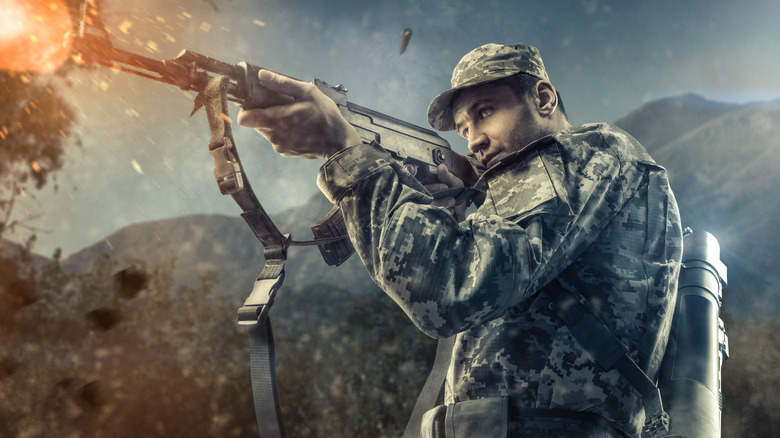Secrets The Gaming Industry Doesn't Want You To Know
Video games are so much better than real life. And honestly, if we got real-life achievements, trophies, and skill points to distribute, we'd definitely all exercise more. But there's a dark side to your favorite games, and when it comes to things the industry doesn't want you to know, there's more going on behind the scenes than you think.
A lot of your favorite, endorphin-releasing moments are carefully designed
You know the signs. The music changes, you find a treasure chest full of second chances, a save point is tucked away down a corridor. Boss fight! Be honest, now, and think back to how many last-second, incredible victories you've managed to pull off when you're down to your last few hit points. For that matter, how many jumps have you made by the skin of your teeth? Or lucky shots with your last bullet? That's right: you're being played like the game you thought you just pwned.
Game designer Jennifer Scheurle tweeted her colleagues and asked them to share some of the hidden mechanics they've built into games. All those instances we just talked about are made possible by programming magic written just to give you more of those "OMG" moments (via Polygon). Games like Assassin's Creed, BioShock, and Doom all have mechanics where the last few hit points are worth more, so you have a better chance of eking out a last-minute win. Spec Ops and BioShock enemies have a 0 percent hit rate built into their first shots. Off-screen enemies in Devil May Cry won't attack. And those white-knuckle, daring leaps? They're fudged in your favor, too, in a mechanic that gives your character a virtual boost even if your uncoordinated mitts flub the jump. It's called "coyote time," after Wile E. Coyote. In other words, you're so predictable, developers program games to cover for your shortcomings.
Your dollars aren't going to the people who create the games, they're going to publishers
Ever get all nostalgic and buy a replacement copy of a long-lost favorite game for a replay? You may have done it secure in the knowledge your purchase was putting gil right back into the pockets of creators so they can keep making more games, but freelance developer Simon Roth told ArsTechnica that's often not the case.
He said most game creators and developers are given a one-time payment for their work, no matter how well a game does. There are hundreds of games out there making money for the publishers alone, who are presumably using it to line their treasure chests and fill their deep, dark dungeons. At the time of Roth's expose — 2012 — the only people who were likely to get royalties from a game were celebrity voice actors and senior management.
And it hasn't gotten any better. In 2015, Polygon reported Descent had been pulled from GOG.com because developer Parallax Software and publisher Interplay had been fighting over royalties for a long time. Parallax hadn't seen a dime of any of those sales for eight years, the kind of deal that would make Scrooge cackle happily over his gruel.
The gaming industry was female-friendly until Nintendo changed its target market
You remember Gamergate, right? At the heart of the problem was the opinion of a vitriolic and vocal part of the gaming community made of men who believe girls' cooties make them not only incapable of playing, designing, and enjoying video games, but unworthy of being gamers. There are a ton of issues women face when they try to make their way into gaming's boys' club, but journalist Tracey Lien found something interesting about the history of women in video games: they've been in it from the very beginning.
Lien (via Polygon) found there were women in the early days of the industry, and they were giants. Atari's Carol Shaw was the driving force behind games like River Raid, Lori Cole designed and co-wrote Quest for Glory for Sierra, and Sierra itself was extremely gender-neutral. Remember King's Quest? Remember the female main character? That wasn't an accident, and according to designer Roberta Williams, it wasn't a big deal to have a female lead–because games were for girls, too.
What changed? The video game market was flagging in the early 1980s, and Nintendo stepped up to grab the Player One controller. It needed a target market to start making some serious cash, and it re-branded its system as a toy instead of a game. And everyone knows there are boy toys and girl toys, so the market focused on boys. The industry never looked back.
Gamers are prime targets for hackers
It doesn't matter what kind of games you play, you know you need to pay for it. The craftiest 4-year-old in the family isn't the only one with his eye on your credit info, either. Gamers are a dream date for hackers and identity thieves.
Trend Micro took a look at what makes gamers such perfect targets, and it boils down to a combination of a competitive fan base driving a game economy that's linked to a real-world one. Now add in a complete lack of regulations governing these pocket economies.
It's also pretty easy to hack gamers by sending out phishing emails asking them to complete a survey, or secure their account details because it looks like they may have been hacked. Not only can hackers get access to things like credit card information, but they could also liquidate a player's virtual treasures for real-world cash. The industry probably doesn't want you to know how absolutely incompetent they've been in trying to stop this. In 2017, The Verge reported on a lawsuit that claimed a Chinese company had been hacking Xbox accounts and then selling the information on the black market. That's bad, but even worse was the claim they'd been doing it since 2015, and Microsoft hadn't been able to stop them yet. You might want to double-check your account. Like ... right now.
Developers outsource a lot of their work, then won't allow companies to discuss it
Outsourcing is nothing new, but in the gaming industry, it's a huge problem. Let's take Polygon's interview with Hyde president Kenichi Yanagihara. What, you've never heard of Hyde? You've definitely heard of the games they've worked on. Their projects include titles in the Final Fantasy franchise, but since a lot of their work is done under some serious non-disclosure agreements, they're completely forbidden from even mentioning about 70 percent of the things they've done.
"That's too bad," you're probably saying, "but how does this affect me?" Well, Dear Gamer, look at it this way. We know you love a constant stream of new adventures being delivered to the console of your choice, so say you came across Hyde's Kickstarter for an awesome new game. Only, you have no clue who Hyde is. No one seems to, and people are saying exactly that on social media. Are you going to take a risk to help fund them?
Exactly. Hyde makes their bread and butter thanks to something called white label development, which isn't an entirely bad thing. What is bad is when secrecy shackles smaller game developers and ultimately prevents them from releasing their own titles even if they've had plenty of experience building some of the biggest games out there. No one knows about it, no one cares about them, and more amazing games just don't get made. Not cool.
Working conditions at developers aren't great
Ever hear that motivational bit about doing what you love and never having to work a day in your life? When it comes to gaming, that's crap. Working behind-the-scenes building your favorite game world seems potentially cool, but the reality is pretty different.
The world got its first look behind the curtain in 2004, thanks to Erin Hoffman's online journal. The then-anonymous Hoffman detailed her husband's 12- and 13-hour work days, seven-day work weeks, and unpaid overtime laboring away for EA. According to The Guardian, those in the industry weren't shocked by it because it wasn't just EA — it was everyone. There was a class-action lawsuit that tried to get employees the overtime they were due, but in 2015 it didn't look like a whole heck of a lot had changed. Crunch time and unpaid overtime was pretty much expected, and so was dreaming of lines of code, no decent sleep, and burn-out.
A few years after the EA lawsuit came similar accusations leveled against Rockstar (via Kotaku), and another anonymous game designer added his or her voice to the mix in a 2016 editorial for The Guardian. It wasn't just the long hours that made the job miserable, it was unrealistic deadlines, maximum stress, minimal family time, and the never-ending arguments that go along with it. Doesn't sound like so much fun after all, does it?
Game publishers buy positive press, coverage and reviews with some serious bribery
Let's say you're looking for something new to play. Do you read reviews to help you decide on something? If you do, you might be the target of a major con.
In 2010, Tae Kim was a game reviewer for GamePro (via ArsTechnica). He was courted by Activision and treated to a sneak peek of Call of Duty: Black Ops, which is fine. But do you know what else he was treated to? An all-expenses-paid trip that included a personalized flight helmet, a helicopter ride to the Ojai Valley Inn and Spa in California, and a few days to review the game while kicking back in some seriously posh, luxurious surroundings.
We're not accusing that particular review of being influenced in any way, but we are saying the gaming industry definitely isn't afraid to wave massive wads of cash around in the direction of reviewers. In 2014, Kotaku looked at what YouTubers agreed to in exchange for being allowed to review Middle-earth: Shadow of Mordor, and the terms of their contracts were pretty telling. Not only did they agree to only "promote positive sentiment about the game," but they walked away with a paycheck from the game's publisher, Warner Bros. Interactive, based on how much praise they provided. It wasn't until 2016 that TechCrunch reported on a fine Warner Bros. paid for tampering with reviews, but they're definitely not the only ones that do it. Guess you should probably just play and form your own opinions, right?
Voice actors have it incredibly tough
Voice actors can make or break a game–and if you're not convinced, just take a listen to Final Fantasy X's nightmare-inducing cutscene of Tidus laughing. No one who watches can argue against spending extra cash to make good voice talent happy. But that doesn't happen and, in some cases, voice actors are pushed to unthinkable extremes to get a performance.
They went on strike in 2017, PBS reported, with a laundry list of complaints. Actors are typically paid a one-time fee (and get no cut of royalties), and work four-hour shifts that can do some serious physical damage. According to Steve Blum, whose work you know from games in the Star Wars, Marvel, and Final Fantasy franchises, he's done damage to his body that's left him throwing up and bleeding from the throat. He said he's one of the lucky ones, citing countless colleagues who required surgery to repair injuries from vocal strain. In his official 2016 statement, he talked about recording sessions where actors literally screamed for four hours, and how they're sometimes required to motion-capture stunts–with no stunt coordinator. The other big gripe was not being given any context as to who their character was, and that's a huge one. Ever wonder what kind of person would play the child-murdering terrorist? It's possible the actor was just as surprised as you.
Gang members have been found communicating over voice chats
Let's face it, we're gamers because real life can be pretty crap a lot of the time. We're happy to forget about our problems for a bit and head into the Wasteland or march to war against some orcs. It's totally not cool when the real world comes kicking down the doors of our virtual one, and gangs are extra not-cool.
In 2011, the FBI's National Gang Threat Assessment task force (via Kotaku) released their findings that virtual worlds were intersecting with gang life in a pretty unthinkable (and frankly, annoying) way. They'd found gangs were using Second Life to communicate with each other and to recruit and train members for operations going on in the real world.
Swatting is becoming increasingly dangerous
It's important that we note that gamers, like all other humans, aren't all created equal. While many are completely normal, functional members of society, others are incredible jerks who think it's hilarious to call law enforcement to falsely report horrible crimes happening at someone else's home. According to The Guardian, "swatting" went mainstream in 2015 when armed officers were dispatched to the home of Joshua Peters more than once. Peters, who had more than 60,000 Twitch followers at the time, had no idea why he was targeted. In 2016, The Guardian was prompted to ask how long it would be before a swatting incident led to the use of potentially deadly force. And because the internet has never been one to back down from a challenge, it quickly gave an answer: 2017.
That's when a 21-year-old British man called a U.S. terrorism hotline and impersonated gamer Tyran Dobbs (via The Independent). He claimed he was in possession of explosives and hostages who would die unless someone dropped off $15,000. The police loaded up. When Dobbs answered his door, he took a barrage of rubber bullets, breaking his bones in his face and causing some serious internal damage. Dobbs later gave an interview, wanting to know just how the call hadn't been traced to England and why the whole incident unfolded as it did. Excellent questions, Mr. Dobbs.
Unregulated game economies are being used for money laundering
Some people log in to their favorite MMO for the story, the PvP, or the RP, but others are the wheeler-dealers of Tamriel, Norrath, and Azeroth. They buy low and sell high, they have more gold in their bank than they could ever spend, and they know way too much about the in-game economy. But do you know who else knows way too much about it? The cyber-criminals who use those in-game economies for money laundering.
In 2013, the United Nations Office on Drugs and Crime published their findings on the use of online games to move money all over the world. Wired dove a little deeper and found that Second Life and World of Warcraft were two of the biggest games used for money laundering. The premise was surprisingly simple. Through the use of multiple accounts, real money would be turned into in-game currency, sent to another player, then re-sold for real money. It's brilliantly simple, and it's aided by the fact these virtual economies aren't regulated by the same laws real-world banks are. Plus, there are no international boundaries in Azeroth. (Save, maybe, Alliance vs. Horde, but who actually plays Alliance, anyway?) There's an important lesson here. Don't buy your gold, work for it like the rest of us.
North Korea is using video games as violent propaganda
For a long time, gamers, industry giants, and naysayers have been waging a war to decide whether there's a link between violent tendencies and video games. So the gaming industry would probably prefer to keep it quiet that North Korea is using video games to spread some pretty violent ideas. In August 2017, The Washington Post reported there was a new 3-D sniper game out in North Korea called Hunting Yankee. Can you guess what it's about?
The game was just another in a long line of games like Confrontation War and Guardian, released by the North Korean Advanced Technology Research Institute and designed to foster specific ideas about the U.S.
The use of video games as vehicles of violent propaganda goes back years. In 2013 Kotaku reported on some of the weird games put out by Uriminzokkiri, a North Korea-controlled, China-based web portal. The games were equal parts bizarre and disturbing, including games where players could guide a noose to hang conservative politicians, beat up the president of South Korea, and play a sort of whack-a-mole with other South Korean politicians. There's no real answer on whether video games can foster violent tendencies, but we know where North Korea stands–and we don't want to be anywhere near there. Just give us our games back.













